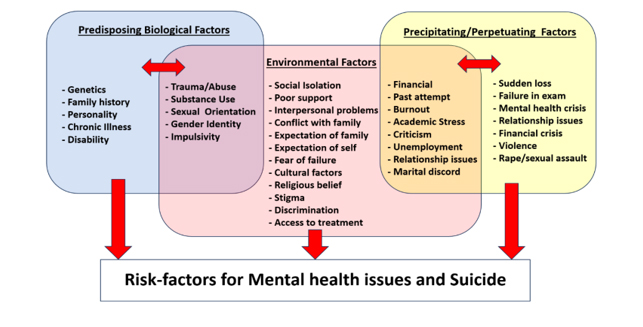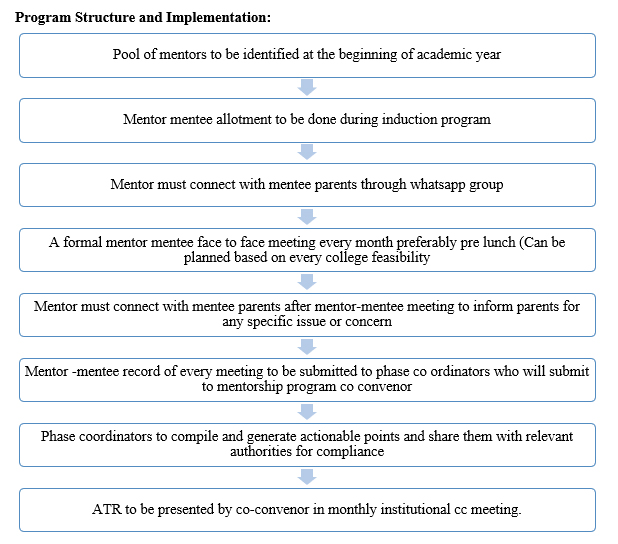Best Practice 2 (2023-2024)
Title : Tripartite Mentorship program
The context that led to initiation of practicePreceptorship and Mentorship are both based on principles of adult education. As such, Preceptorial relationships are especially useful in developing the practical skills of students. The preceptor works either with small groups of students or one-on-one with individual students, and serves as a teacher, role model, and evaluator. Preceptorial relationships between a teacher and a student are relatively short, and generally span the duration of a course or student rotation. Mentoring involves an intense, global, and long-term relationship between a mentor and a mentee, and-encompasses both professional and personal domains. It spans several years and may extend far beyond the period of the structured mentorship. The mentor serves as a teacher, role model, coach, and confidant to the mentee and works one-on-one with a mentee to achieve various outcomes. A preceptor may use mentoring skills or approaches in providing support to a preceptee during a preceptorship programme.
According to The Report of the National Task Force on Mental Health and Well-being of Medical Students, NMC, June 2024, existing global literature recognizes that 30-40% of medical students report mental health problems. There is high prevalence of anxiety, depressive disorders, suicidal ideation, substance use disorders, as well as stress and burnout in this population and advocates mentor – mentee program in sub clause 3.1.6. The New CBME guidelines, 2024 has emphasized Mentor-mentee program in the ratio of 1:3 for every incoming batch so as to provide learners with supportive learning environment and timely addresses any risk factors for mental health issues as depicted in fig 1.
DMIHER has a ‘Tripartite Preceptorship Program’ in vogue , practised by all constituent colleges of the University. It is denoted as Tripartite due to the inclusion of Parents as one of the stakeholders along with mentor and mentee. As mentioned in preceding paragraphs; in view of rising mental health concerns among learners in higher education; the scope of Mentorship program was broadened to include parents as well, to help and support every student in adjusting to campus life , address their needs and concerns, offer timely remedial measures, thereby achieving his/her full potential by the end of professional training and even beyond; all while keeping parents in loop.

Fig 1 : Adopted from Report of the National Task Force on Mental Health and Well-being of Medical Students, NMC, June 2024
Objectives:
- To adequately and timely address Learner’s adjustment, academic and personal issues and concerns
- To provide moral, psychological and emotional support to the learners
- To encourage, guide and support the mentee to reach her/his full potential by sharing knowledge and experience
- To keep parents informed about learner’s academic progress and any concerns arising from time to time.
Process:

- Sensitization of mentees to mentorship programme during induction by co-convener /convener: Offer thorough orientation for mentees on the mentorship process, including its purpose SOP & what to expect from their mentors
- Collection of regular feedback from both mentors and mentees regarding the program’s effectiveness and areas for improvement via google forms by co convenors of respective colleges via phase coordinators (for mentor) and via mentors for mentees.at interval of six months
- Feedback obtained will be used to make adjustments to the program’s structure, or support mechanisms.
- Implementation of award for excellence in mentorship to motivate and acknowledge outstanding contributions in the form of Annual mentorship award
- First meeting of the mentor-mentee to be conducted with focus on orientation of students to diary , maintaining the diary throughout all four years, all entries to be done and emphasis on other personal or professional issues to be encouraged in future meetings.
- Whats app group to be formed: 1. mentor with mentee and 2. Mentors and parents of mentees.
- Meeting to be scheduled every month preferably on any day in early hours: like 3rd Saturday morning 9-9.30 to 10.00. However, this is upto the discretion of the individual HOI
- One meeting in a month is mandatory. However, the mentees can meet the mentors as and when they wish as per their needs.
- Duration of the meeting be at least for half hour to one hour depending on the need.
- Discussion on hostel issues and mess should not be encouraged and be dealt with in hostel committee meetings
- The meeting of the co-convener and phase coordinators should be held once in every month and that with the presence of convener once in every three months.
- The report of the same be reflected in college council meeting
- Random check of diary by the co-convener to be done and also the monitoring of the meetings conducted.
Mentor mentee meeting agenda includes :
- Adjustment to campus life
- Curriculum updates and related concerns
- Class/ Practical/Clinic conduction, regularity, any related specific issues
- Learning issues
- Attendance (Current & Progressive), Performance in examination.
- Academic appraisal program compliance
- Any other grievances
Outcome and Impact of practice:
- Broadening the scope of current preceptorship program has served as an immediate step to align with ‘Mental health’ concern at National and global level.
- The percentage of students being referred to Student Guidance Unit have significantly reduced from 10.3 % to 6.4% in last three years.
- It has streamlined the process of identifying mental health issues of students at an early stage since the first mentor mentee meeting at the start of professional year involves psychometric analysis of every mentee. Mentees who require special attention are thus identified at the beginning of professional year of training by the mentor. Accordingly support mechanisms are put in place to cater to the specific learning need and styles and emotional well-being of the student.
- Involving parents during the mentor mentee meetings and sharing monthly report with them helps in keeping the parents informed about their ward’s academic progress and concerns. It also provides a constant opportunity to parents for interacting with mentors and understand the University policies, practices and initiatives.
- As new fresher mentees are added to the pool in a specific mentor mentee group; junior students get a chance to be mentored by senior students of the same group. A cognizable sharing of experiences and learning occurs during such interactions.
